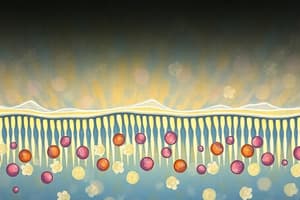Podcast
Questions and Answers
Which law drives the movement of substances across cell membranes in passive transport?
Which law drives the movement of substances across cell membranes in passive transport?
- Second law of thermodynamics (correct)
- Newton's law of motion
- First law of thermodynamics
- Law of conservation of energy
What is the main factor that determines the rate of passive transport?
What is the main factor that determines the rate of passive transport?
- Cellular energy
- Permeability of the cell membrane (correct)
- Concentration gradient
- Organization of membrane lipids
What is the net movement of material from an area of high concentration to an area with lower concentration called?
What is the net movement of material from an area of high concentration to an area with lower concentration called?
- Facilitated diffusion
- Filtration
- Osmosis
- Diffusion (correct)
Which law does passive transport follow?
Which law does passive transport follow?
What type of membrane transport does not require energy?
What type of membrane transport does not require energy?
Flashcards are hidden until you start studying
Study Notes
Passive Transport
- The movement of substances across cell membranes in passive transport is driven by Fick's Law of Diffusion.
- The main factor that determines the rate of passive transport is the concentration gradient.
- The net movement of material from an area of high concentration to an area with lower concentration is called diffusion.
- Passive transport follows the laws of thermodynamics.
- Passive transport is a type of membrane transport that does not require energy.
Studying That Suits You
Use AI to generate personalized quizzes and flashcards to suit your learning preferences.




